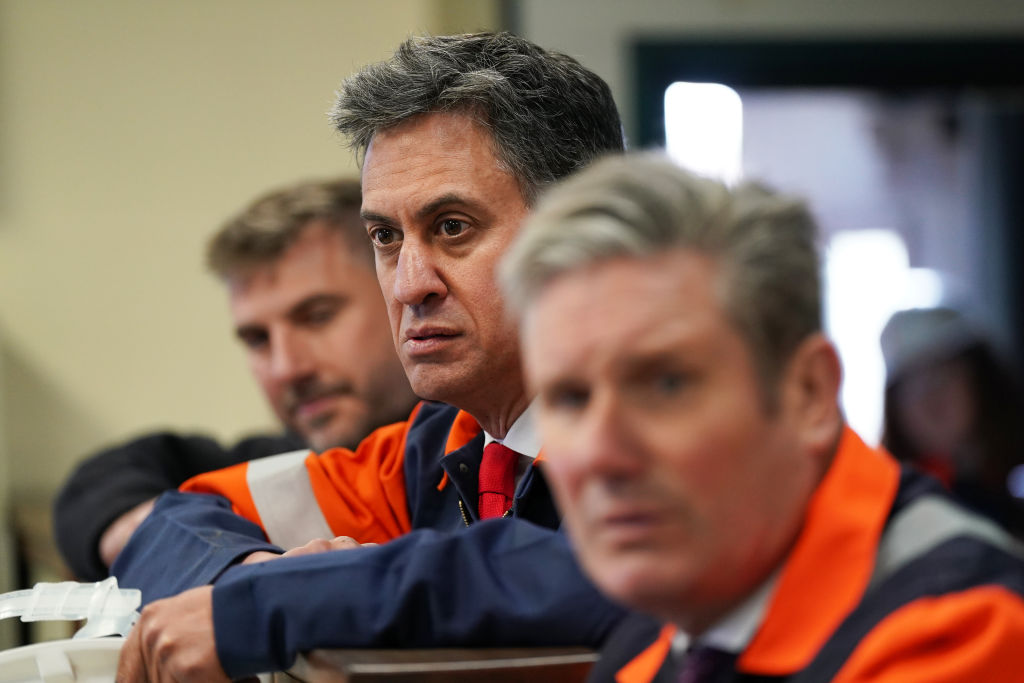Almost a decade on from Scottish Labour’s 2015 general election wipe out, a spectre is once again haunting the party in Scotland – the spectre of Ed Miliband. Apparently not content with his role in leading the party to near oblivion in Scotland eight years ago, the shadow secretary of state for climate change and net zero is now determined to stifle its recovery as well.
Miliband’s latest manoeuvres began more than a week ago, when he engineered an announcement that a future Labour government would not grant any new licences for oil and gas production in the North Sea. The announcement caused consternation not just from the industry itself, but also the Scottish Labour party, which was infuriated with its timing and largely blindsided by the policy shift. Many Labour MSPs – including some who remember the Miliband years all too well – were incandescent, and with good reason.
This policy is not just economically illiterate, but self-defeating of Labour’s stated goal to deliver a transition to green and clean energy
A ban on new licences would be economically ruinous for the north-east of Scotland, leaving the industry and its tens of thousands of employees facing a cliff-edge end to production. Even now, despite significant demand, oil and gas producers in the region are already struggling to make North Sea investments profitable due to the UK’s tax regime. Harbour Energy, the UK’s largest oil and gas producer in the North Sea, has already announced it is cutting around 350 jobs after the government’s energy price levy largely wiped out its profits. Labour’s policy – in effect calling time on the North Sea industry altogether – would clearly be a hundred times worse.
Yet the policy is not just economically illiterate, but self-defeating of Labour’s stated goal to deliver a transition to green and clean energy. Such a transition relies on significant investment from energy producers, as well as the skill set of Scotland’s North Sea workforce, if it is to be deliverable at the scale that is required. By cutting off a key source of funding for energy companies, Labour is also cutting investment and research in the green technology and skills that are necessary to make a transition away from oil and gas viable.
Aside from the economic folly of the position itself, it is also deeply damaging politically to Scottish Labour and its nascent recovery in Scotland. It positions the Labour Party against the majority of public opinion in Scotland. This was demonstrated most recently in a poll by Survation, which showed 61 per cent of people in Scotland believe the North Sea industry has a positive impact on the economy, and an overwhelming 75 per cent believe demand for oil and gas should be met from domestic production.
It has also allowed the SNP – itself conflicted on how to manage North Sea reserves – back on to the front foot. Nationalists were quick to criticise Labour’s policy, using it as an opportunity to try and reframe their own previous opposition to new oil and gas investment and reclaim some of their lost support. The situation has been further compounded by Rachel Reeves’ understandable if politically unfortunate decision to scale back Labour’s proposed £28 billion a year investment in green energy projects, which the SNP suggested was not only Labour calling time on Scotland’s fossil fuel industry, but its renewable industry as well.
Labour’s policy has left the Conservative party as the only avowedly pro-oil and gas party in the north-east of Scotland. This could give the Conservatives a vital reprieve and allow them to cling on to their seats in the region, an eventuality that could prove costly to Labour should the general election prove tighter than polls currently suggest.
Of course, there is a constituency for taxing and legislating oil and gas producers to extinction, and Miliband clearly believes this – and not the disastrous 2015 general election result – can be his legacy. But in searching for a positive place in history, Miliband may well once again cost Scottish Labour dear, and perhaps even Sir Keir Starmer a place in No. 10.






Comments